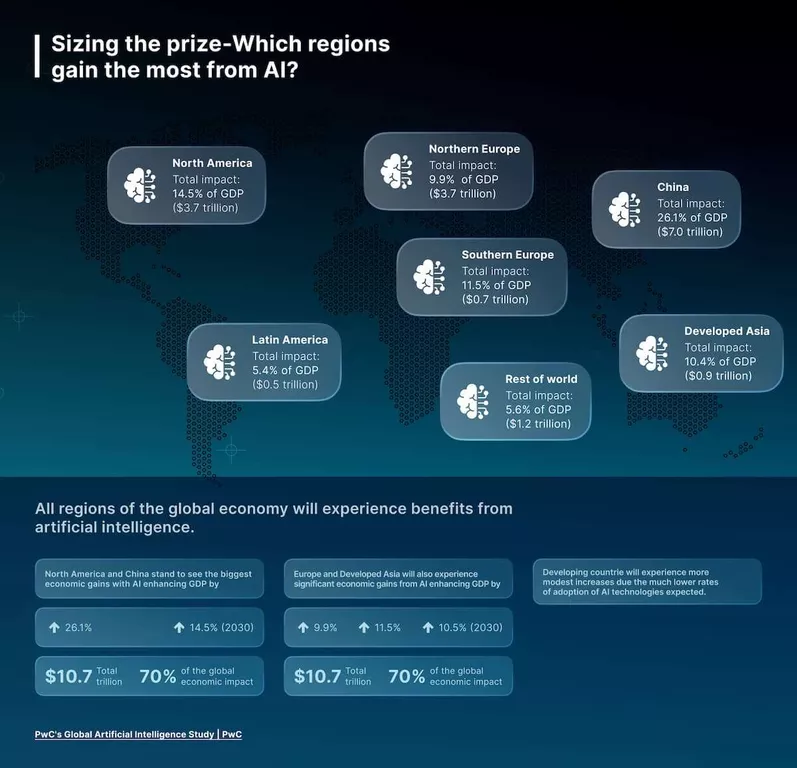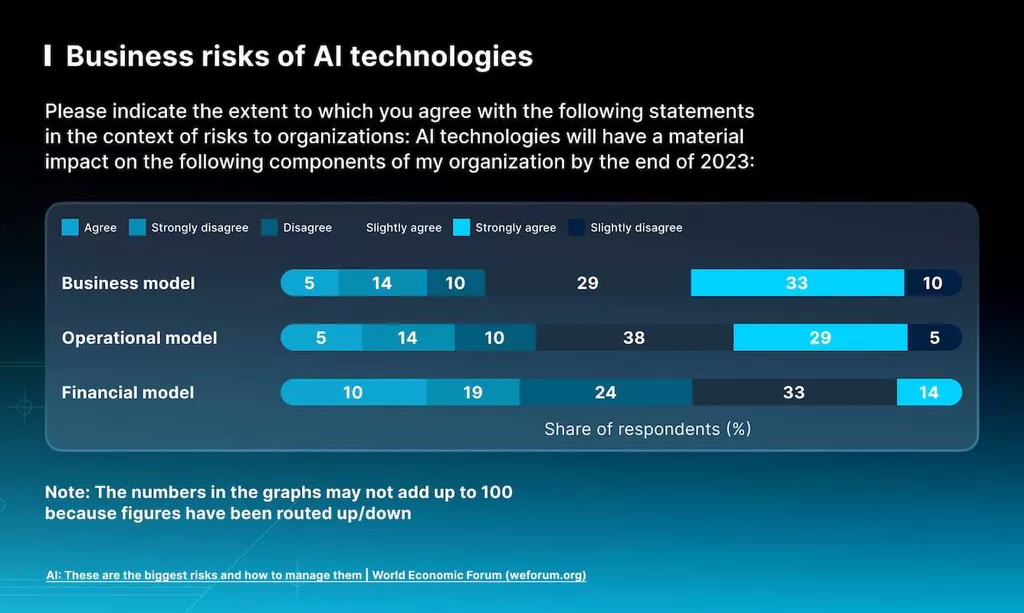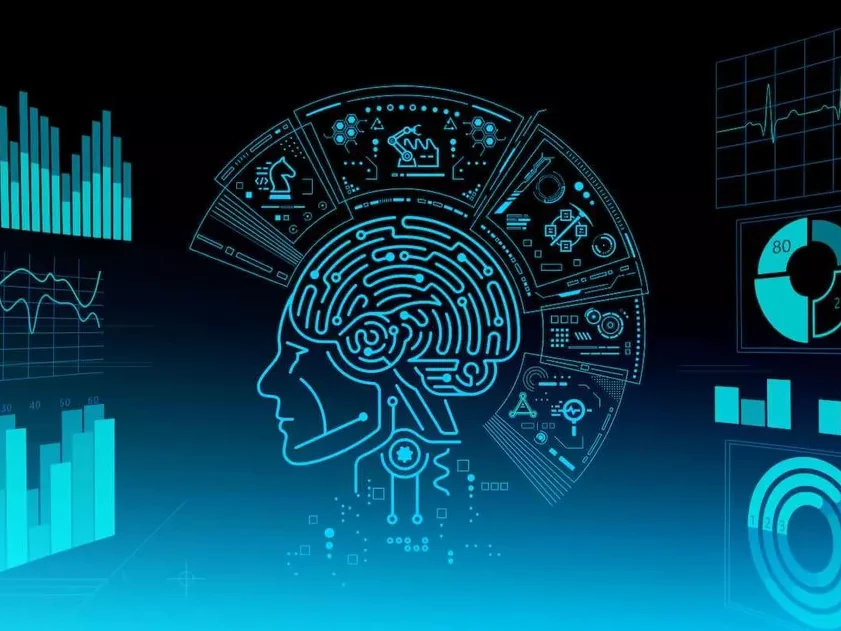According to PwC, AI may change the efficiency and size of the world economy’s GDP. It requires vast investment in different groups of artificial intelligence technologies.
A PwC study says that 45% of overall economic growth by 2030 will come from improved products that drive consumer demand. AI-ruled instruments may increase the variety of commodities and personalize the client experience. The most significant economic benefits from implementing modern techniques will be in China (26% GDP growth by 2030) and North America (14.5% growth), representing $10.7 trillion and approximately 70% of the world economic impact of AI.
In this blog, we discuss how AI is changing the world’s financial structure today, how it affects your company, and what risks arise when adopting generative AI technology (genAI).

What’s Happening Now with GenAI?
Statistics of economic impact of AI show that it is revolutionizing world finances, creating unparalleled opportunities for enterprises and governments. Let’s discuss the significant tendencies and ideas that are shaping the future of genAI in the world economy today:
- Updating economic services: in the financial field, AI-ruled structures quickly change the game’s rules by providing actionable data and ensuring informed decision-making. The introduction of modern techniques, machine learning (ML), and predictive analytics allow economic institutions to process a considerable database and balance activity. As claimed by Juniper Research, the addition of chatbots in the financial area has increased by 200% in 2023. Digital assistants process requests, provide advice, and negotiate transactions on behalf of buyers, growing the productivity of economic services.
- Improving business actions: AI-ruled automation is changing business procedures in all fields. Accenture calculations demonstrate that the economic impact of automation and AI increases labor efficiency by up to 40% in some areas, which reduces expenditures and raises operational efficiency. Processing insights, including predictive maintenance, prescriptive analytics, and real-time balancing, improve every link in the supply chain and minimize downtime. Some AI-ruled structures may determine failures before they happen, providing thousands in maintenance savings.
- Personalized customer experience: genAI is changing how enterprises interact with their target audience by offering personalized recommendations based on consumer preference and behavior. In a survey, Deloitte found that 62% of clients are more likely to buy from merchants who offer customized advice. AI-ruled tools refine the quality of commodities and raise client contentment and loyalty. AI processes user information in real-time and forms individual advice.
Adding AI-ruled structures to the global financial structure is not just a whim but a necessity, as it may improve various aspects of business, from making informed decisions to reducing risks, resulting in increased earnings and prosperity.
What Will Happen in GenAI Field?
According to a McKinsey study, the economic impact of AI could add between $2.6 trillion and $4.4 trillion annually to the economy across the 63 scenarios analyzed. It will increase the effect of AI-ruled tools by 15-40%, and this estimate may rise several times if you add the economic impact of artificial intelligence to programs that are utilized today to solve other problems that are not included in the list of use cases analyzed.
Financial experts note AI impact on business is maximum in four industries: client experience, marketing and sales, digital product creation, and research and development. However, other sectors outside these four, including retail, banking, medicine, and pharmaceuticals, will also be transformed by adding AI. According to McKinsey calculations, genAI could generate an additional $400-660 billion due to productivity growth of 1.5-2%, and this is just one of the suggested options.
It is a technology that may change the fundamentals of business functioning, raising the potential of personnel through automation and saving 60-70% of the working hours spent. Given the considerable potential of technical automation, it enables rapid workforce transformation.
The current pace of automation implementation suggests that up to 50% of all work activities will be successfully automated from 2030 to 2060. In the long term, this could increase global GDP by as much as 7%, which would have a gigantic influence on the worldwide financial structure.
GenAI also plays a crucial role in developing the green economy. Artificial intelligence potential allows humanity to decrease greenhouse gas emissions by about 4% by 2030, as claimed by the World Economic Forum. With progressive analytics and ML, it will be possible to minimize energy use, decrease emissions, and decrease the carbon footprint.
How Can the Evolution of GenAI Refine the Business?
GenAI is a stage forward in AI development, and as firms add it to their operations, they may appreciate the potential such platforms have for society and the economy.
An essential benefit of introducing genAI solutions is their ability to automate and improve creative processes, saving time and capital. This technique is available to all users; there are no strict barriers to entry. Now, everyone can take advantage of its functionality and become a creator. Considering genAI’s ability to create different types of content (texts, pictures, codes), its capabilities are enormous.
By learning from large databases, genAI generates novel content or reduces the expenditure on its conceptualization. These structures suggest unique use cases in marketing, journalism, commodities design, etc. Recently, the Coca-Cola Corporation announced it is utilizing genAI to write many advertising materials, guaranteeing significant efficiency and time savings.
Separately, it is necessary to talk about the economic impact of AI on science and pharmaceutical activities since they speed up processes and cut expenditures. Their ability to process large databases allows concepts to be quickly generated and checked at minimal cost, decreasing the time it takes to create modern drugs.
In the educational area, the potential of generative AI allows it to refine the teaching system. Japan recently announced that students may use genAI to facilitate class discussions and art activities. AI-ruled instruments are also helpful at the planning stage of lessons or training programs to provide a personalized learning experience based on algorithmic research into learning patterns and areas of interest of students.
The Primary risks of GenAI
While generative AI next frontier promises to bring significant benefits to business and society, it can also bring considerable harm if we do not learn to deal with the risks such techniques pose. This view was expressed by chief risk officers (CROs) of large enterprises participating in the World Economic Forum’s large-scale risk study.

- Among the most significant risks CRO identifies is the malicious use of AI-ruled systems. Because genAI’s techniques are easy to use, they can be used by attackers who want to spread disinformation, plan cyberattacks, or gain access to personal insights.
- Another risk of AI comes from its opaque internal functioning. As stated in the report, no one fully understands how content is generated through AI-ruled systems. It raises the risks of disseminating confidential information and bias when making decisions based on AI-backed solutions.
- The lack of a clear understanding of how AI operates also makes it challenging to predict future risks. However, CROs have determined that the sectors most exposed to risks from AI are business operations, commercial models, and tactics.
All respondents agreed the development of genAI is outpacing their ability to deal with potential social and ethical risks, and 43% of respondents believe the introduction of progressive technologies should be slowed or stopped until their impacts are fully understood.
Final Words
The epoch of genAI is just starting. There is significant excitement about these technical solutions, and the first projects look compelling. It will take time to realize the total profits of such a system, and business leaders will have to overcome many challenges associated with managing risk, identifying the right skill sets for the workforce, and rethinking key business processes.
If you are planning to add AI-ruled systems to your enterprise but do not know where to start, we recommend you contact Metadialog specialists for help. Our specialists are ready to help you create a multilingual AI-ruled structure. All technologies can be easily synchronized with current business processes and corporate policies. They are a great addition to any company’s software. You can book a demo right now to keep up with the progress!
